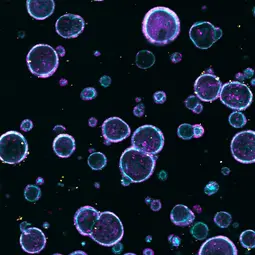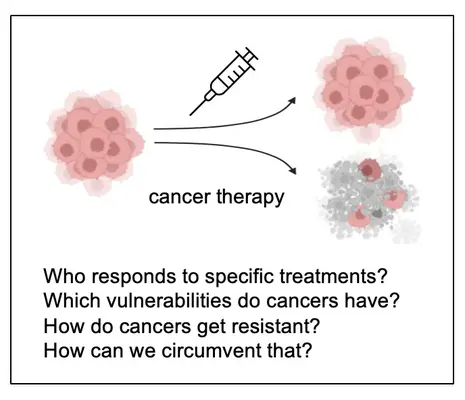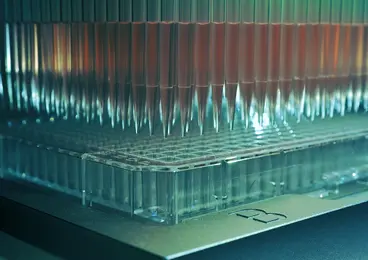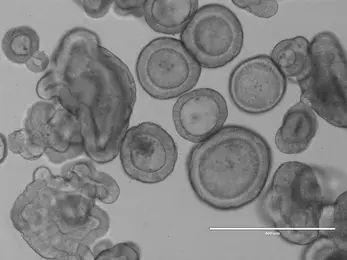Translational Gastrointestinal Oncology and Preclinical Models
- DKFZ Hector Cancer Institute
- Functional and Structural Genomics
- Clinical Cooperation Unit
- Junior Research Group

apl. Prof. Dr. Johannes Betge
Group Leader
Curing advanced cancers of the digestive tract remains a major challenge. We contribute to improving the treatment of these diseases by gaining insights into cancer biology and therapy resistance mechanisms using cutting-edge high-throughput approaches with patient-derived tumor models and by translating these findings to bedside through innovative clinical trials.
Image: Patient derived organoids from a colorectal cancer patient, DNA (magenta), actin cytoskeleton (cyan), dead cells (yellow). | © dkfz.de,

Image: Patient derived organoids from a colorectal cancer patient, DNA (magenta), actin cytoskeleton (cyan), dead cells (yellow). | © dkfz.de,
Our Research

Tumors of the digestive tract are among the most common cancers worldwide. Despite significant advances in cancer therapy, curing patients with metastatic tumors remains a major challenge. The overarching goal of our research group is to develop novel, personalized therapies for patients with gastrointestinal tumors and to establish new predictive factors that can better forecast responses to cancer treatments.
Research Priorities
Our work focuses on investigating tumor biology of gastrointestinal cancers - particularly the mechanisms driving resistance to cancer therapies - and translating these insights into clinical practice. We specifically focus on:
- Identification and characterization of genes and signaling pathways impacting response and resistance to chemotherapy and targeted therapies
- Mechanisms of tumor cell adaptation to treatment
- Testing novel therapies and combination approaches (e.g., drugs, radiotherapy) in preclinical studies and analyzing their underlying mechanisms.
Methods and Technologies
To unravel the complex mechanisms of tumor biology and therapy resistance, we employ cutting-edge technologies:
- Organoid models: We use 3D cell cultures derived directly from tumor and normal tissue biopsies from our patients. These organoids retain essential molecular characteristics of the original tumors and serve as precise models for preclinical analysis of therapies.
- High-throughput drug testing: Using our robotics-based platforms, we simultaneously test hundreds of drugs for their effectiveness in organoids.
- Multi-omics approaches: By integrating genomic, transcriptomic, and proteomic data, we uncover links between molecular changes and therapy responses.
- Single-cell technologies: High-throughput microscopy and single-cell sequencing, combined with co-culture systems involving cells and factors from the tumor microenvironment, provide detailed insights into cell-cell interactions.
Impressions
-

Colon Cancer organoids, brightfield, © dkfz.de -

High-Throughput Pipetting 384-wells, © dkfz.de -

Extracellular Matrix domes in a 6-well plate, © dkfz.de -

Colon Cancer Organoids, brightfield, © dkfz.de -

Immunofluorescence stainings of colorectal cancer organoids. Blue = DAPI, red = phalloidin, green = alpha tubulin. © dkfz.de
Goals and Relevance for Society
Our aim is to gain a deeper understanding of drug response in gastrointestinal cancers and use the findings from our preclinical projects as a basis for developing and implementing clinical trials, ensuring that our research directly benefits patients. Additionally, by leveraging a personalized approach that includes organoid-based testing, we strive to identify tailored therapeutic options for patients with advanced gastrointestinal tumors.
We collaborate closely with clinical and scientific partners in Heidelberg, Mannheim, and beyond - both nationally and internationally - to translate our research findings into the clinic and improve cancer treatment options in the long term.

Team
-

apl. Prof. Dr. Johannes Betge
Group Leader
-

Dr. Theresa Mulholland
Postdoc
-
Yvonne Petersen
Lab Technician
-

Philipp Albrecht
PhD Student
-

Ekin Karabati
MD Student
-

Lucrezia Tondo
PhD Student
-

Dr. Kyrhatii Trikhirhisthit
Clinician Scientist
-

Zhenchong Li
MD Student
-

Ping Sui
MD Student
-
Shrihar Kanikar
Technician (Mannheim)
Selected Publications
From organoids to bedside: Advances in modeling, decoding and targeting of colorectal cancer
Betge J, Jackstadt R.
The drug-induced phenotypic landscape of colorectal cancer organoids
Betge J, Rindtorff N, Sauer J, Rauscher B, Dingert C, Gaitantzi H, Herweck F, Srour-Mhanna K, Miersch T, Valentini E, Boonekamp KE, Hauber V, Gutting T, Frank L, Belle S, Gaiser T, Buchholz I, Jesenofsky R, Härtel N, Zhan T, Fischer B, Breitkopf-Heinlein K, Burgermeister E, Ebert MP, Boutros M.
Precision Medicine for Metastatic Colorectal Cancer in Clinical Practice
Riedesser J, Ebert MP, Betge J.
Cancer-Associated Mutations in Normal Colorectal Mucosa Adjacent to Sporadic Neoplasia
Zhan T, Belle S, Valentini E, Herrmann S, Miersch T, Li M, Gaiser T, Boutros M, Ebert MP, Betge J.
Loss of Chromosome 18q11.2-q12.1 Is Predictive for Survival in Patients With Metastatic Colorectal Cancer Treated With Bevacizumab
van Dijk E, Biesma HD, Cordes M, Smeets D, Neerincx M, Das S, Eijk PP, Murphy VS, Barat A, Bacon O, Prehn JHM, Betge J, Gaiser T, Fender B, Meijer GA, McNamara DA, Klinger R, Koopman M, Ebert MPA , Kay EW, Hennessey BT, Verheul HMW, Gallagher WM, O'Connor DP, Punt CJA, Loupakis F, Lambrechts D, Byrne AT, van Grieken NCT, Ylstra B.
Preprints
Qiyun Xiao, JulianE. Riedesser, Theresa Mulholland, Zhenchong Li, Jonas Buchloh, Philipp Albrecht, Moying Li, Nachiyappan Venkatachalam, Olga Skabkina, Anna Klupsch, Ella Eichhorn, LiWang, Sebastian Belle, Nadine Schulte, Daniel Schmitz, Matthias F. Froelich, Erica Valentini, Kim E. Boonekamp, Yvonne Petersen, Thilo Miersch, Elke Burgermeister, Carsten Herskind, Marlon R. Veldwijk, Christoph Brochhausen, Robert Ihnatko, Jeroen Krijgsveld, Ina Kurth, Michael Boutros, Matthias P. Ebert, Tianzuo Zhan, Johannes Betge
Get in touch with us

